What does ApneaRx do?
ApneaRx is an oral appliance marketed as a treatment to snoring and mild to moderate sleep apnea.
It can purportedly enhance the user’s quality of sleep (as well as that of their bed mate).
US company Apnea Sciences Corporation in California developed ApneaRx while CareFusion is responsible for the distribution of the device throughout Australia.
The ApneaRx device maintains the user’s jaws slightly apart to allow the flow of air.
The top tray remains in a fixed position relative to your upper teeth and the bottom tray is then adjusted forward relative to the top piece in 1 to 10 mm increments.
This means it can push your jaw forward to help keep your airway open to prevent the soft tissue in the back of your throat collapsing.
With the airway open, you breathe normally and quietly instead of flapping around like air escaping from a balloon.
At least that’s the theory, but is it valid?
“FDA Approved?”
The Food and Drug Adminstration (FDA) is a US federal agency which regulates new foods and health-related products.
ApneaRx’s packaging states the product is “FDA approved,” but what exactly does “FDA approved” mean?
FDA approval simply means that it complies with the essential design and safety requirements of such a device, but does not certify how well it works. In other words, they’re saying it won’t hurt you, but there’s no guarantee it will help you either.
Related article: Under Armour Athlete Recovery Sleepwear Review
Apnea Sciences Corporation and previous FDA violations
A bit of detective work shows the developers of ApneaRx have previously been in hot water with the FDA over their marketing claims.
On May 9th, 2013, the FDA issued a lengthy and scathing warning letter to the company detailing various breaches of good manufacturing practices, marketing regulations, and handling of consumer complaints.
In relation to a similar product, the SnoreRx, the FDA cited them for not obeying the marketing rules.
Apnea Sciences Inc. said the SnoreRx aided in the treatment of bruxism (teeth grinding), Trans-Mandibular Joint (TMJ) syndrome according to “clinical studies”, and was BPA-free.
When asked to produce the necessary evidence as requested by the FDA, Apnea Sciences instead elected to just remove the claims from their SnoreRX packaging.
On inspection, the FDA also found a number of flaws with the company’s quality assurance procedures and record keeping.
More specifically, there was a failure to document, investigate and follow up complaints corresponding to returned devices.
The FDA also found a marketing violation on the ApneaRx’s user instructions which claims that the device is “the first line of therapy for mild to moderate sleep apnea and CPAP intolerant patients”.
The FDA requested performance data to substantiate the claim but there does not appear to be any reputable and publicly available data to support this claim.
Interestingly, the FDA’s premarket notification to Apnea Sciences two years earlier (2011) clearly stated: “We remind you, however, that device labelling must be truthful and not misleading.”
Based on the evidence (or lack thereof) presented in the 2013 letter, the company appears to have shirked the FDA’s recommendations.
Apnea Sciences President James Fallon
In the mid to late 1990s, Apnea Sciences Corporation’s president James Fallon was the president of a company called Derma Genesis.
In November 1997, the FDA received notice that Fallon was marketing a product called Derma Peel without obtaining the requisite clearance from the FDA.
Court documents state that in February of 1998, Fallon faxed a forged 510(k) clearance letter to investors.
It included a date stamp from a previous letter from the FDA which, ironically, cautioned him not to market Derma Peel until he obtained prior FDA clearance.
On October 14, 2003, Fallon was convicted one count of wire fraud and three counts of mail fraud in the United States District Court for the Eastern District of Pennsylvania.
He was sentenced to 12 months in jail followed by a 36-month term of supervised release, a fine of $1,000, and restitution of approximately $55,000.
“Recommended by the American Academy of Sleep Medicine (AASM)”
Digging further into the marketing of the ApneaRx, I came across a promotional video posted by Australian retailer Harvey Norman.
The opening shot of the video (see screenshot below) includes a subtitle, “recommended by the American Academy of Sleep Medicine (AASM) and the American Academy of Physicians.”
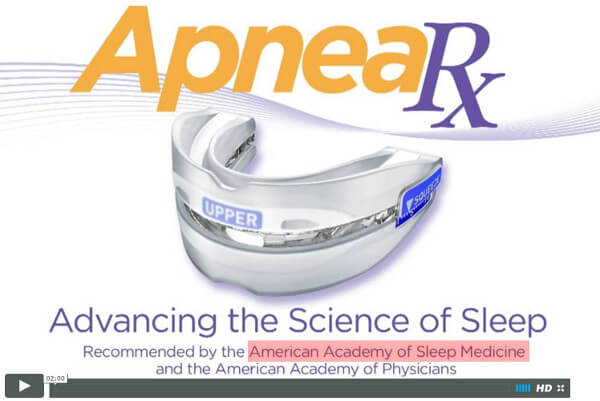
Firstly, there is no such organisation as the American Academy of Physicians.
There is an American Academy of Family Physicians and an American Academy of Dental Sleep Medicine (AADSM) either of which might have been what they intended.
Secondly, I contacted the American Academy of Sleep Medicine (AASM) to verify if ApneaRx was, in fact, internationally recognised by this organisation.
AASM’s Director of Communications Thomas Heffron promptly replied with, “The AASM does not recommend any specific oral appliance device. We will contact ApneaRx immediately.”
Heffron also provided a link to the updated AASM clinical practice guidelines for oral appliance therapy.
Created in conjunction with the AADSM, it recommends “a qualified dentist use a custom, titratable appliance over non-custom oral devices.”
The ApneaRx is a “boil and bite” device that does not meet this criterion.
ApneaRx and Harvey Norman Australia have since taken down the promotional video on Vimeo but the same video can be accessed via the ApneaRx YouTube channel.
Research: Are there any studies to support product claims?
ApneaRx promotional videos (see screen shot below) directly claim that the device “is clinically proven to treat sleep apnea,” “effectively reduces snoring,” and that it is a “preferred alternative to CPAP therapy.”
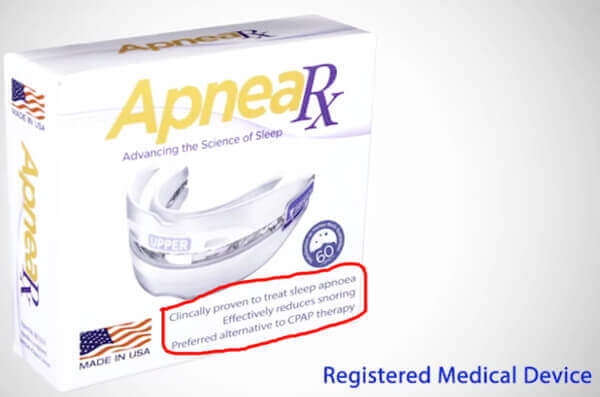
However, a search of the medical journal databases such as PubMed and Google Scholar did not return a single independent peer-reviewed publication for ApneaRx.
So what data is the company referencing to substantiate their “clinically proven” claims?
Apnea Sciences Corporation refers to one unpublished study on their website which was conducted by the company itself in partnership with Kaiser Permanente Sleep Lab in California.
According to the document: “This pilot study was performed to determine feasibility of using it in an anticipated custom mandibular advancement device (MAD) predictor-of-response research study.”
In other words, the study was only trying to determine if using ApneaRx as a “warm up” was a good predictor of a patient being able to succeed and cope with a full custom device.
Twenty-five percent of those recruited opted out due to discomfort including pain and poor fit.
Twelve patients (5%) of the 227 initially recruited were deemed good candidates for a custom device after trialling the ApneaRx at home. It was reported that all 12 had a good response to the specialist custom made device.
All things considered, there is nothing technically “wrong” with this study, however, these results must be viewed with caution for the following reasons:
- The results of this study are irrelevant to ApneaRx’s primary marketing claims that it “reduces snoring” and is a “preferred alternative to CPAP therapy.”
- The study presents a number of limitations and does not provide conclusive evidence of its efficacy in a larger population over a long period of time.
- The information presented is only a poster presentation of an abstract. At the time of this writing, I was unable to locate a full text published manuscript in a peer-reviewed medical journal (i.e., it has not been verified and critiqued by independent scientific review).
Following on from the above discussion, in a video on the ApneaRx’s Australian website, they make direct claims that in “clinical studies, 75% of users slept better, snored less, and felt more refreshed than usual” and that “ApneaRx provides results consistent with those achieved with more expensive custom made oral appliances.”
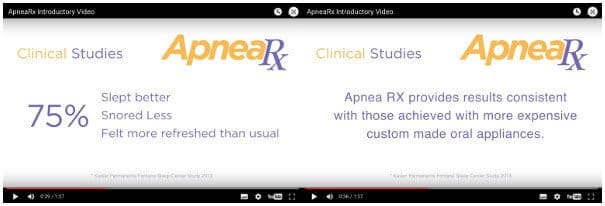
The study referenced in fine print below their claims appears to be the same single pilot study discussed above (not clinical studies, as if indicating more than one).
Unfortunately, based on the publicly available data, the results do not actually support these claims.
In this screenshot from the ApneaRx Australia website (below), the company alludes to the notion that ApneaRx cures sleep apnea.
This claim is false. There is no independent evidence that sleep apnea can be “cured” by pre-fabricated oral appliances (such as ApneaRx).
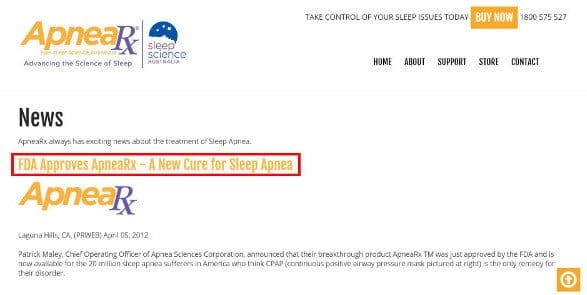
Side Effects
There does not appear to be any significant risk associated with using ApneaRx.
As with any generic “boil and bite” oral appliance, potential side effects might include jaw pain or discomfort and/or teeth and gum soreness.
These side effects could be due to the natural adjustment period, but if pain persists, or becomes severe see your doctor.
Does ApneaRx Work?
The answer to this is both a “yes” and “no” and depends on what you value as evidence.
There certainly is a possibility that ApneaRx “works,” but the company appears to rely mostly on self-reporting from satisfied clients.
According to their own statistics, three out of four clients obtain some degree of relief from snoring and mild cases of sleep apnea.
The other side of that coin is that 25% of people using the device do not achieve relief of their symptoms.
With no objective clinical evidence to back this up, these claims must be taken with a grain of salt (i.e., these are not the same as scientific studies).
The medical literature (i.e., published scientific research) indicates that properly customised oral appliances from a dentist are more likely to be effective and therefore highly recommended over generic pre-fab “boil and bite” devices like the ApneaRx.
Custom oral appliances are better than no treatment and are only considered a first line treatment if a patient cannot tolerate continuous positive airway pressure (CPAP) therapy.
Additionally, the individual’s own dentist has a more complete history of their client, including aberrations in anatomical structure and health considerations.
On the whole, in most cases, a customised device will provide a better result because it’s designed for you.
How much does the it cost?
The ApneaRx retails for around $350 in Australia. The company recommends replacing the unit every 12 months, so you’re looking at $350 per year.
Up front, ApneaRx is relatively inexpensive compared to CPAP machines, masks, and custom made oral devices. However these proven interventions might be money well spent in the long run.
There are also government programs and insurance providers that subsidise these more expensive sleep disorder treatments, so they’re actually more accessible than what you think.
And remember, cheaper does not necessarily mean better.
What is the best treatment for snoring and sleep apnea?
Continuous Positive Airway Pressure works and is widely considered the gold standard treatment for snoring and obstructive sleep apnea.
For some people, it can take some to get accustomed to the device, but once past that, you’ll make it part of your regular sleep routine and wonder why you didn’t seek treatment earlier.
Should I buy ApneaRx?
I can’t tell you what to do with your money, but there are a few key points to consider before purchasing any device.
First and foremost, do you even HAVE a sleep disorder? In order to find out, see your doctor and get a referral to a sleep clinic for a detailed sleep study.
If you are formally diagnosed with a sleep disorder such as obstructive sleep apnea (OSA), then a personalised treatment plan can be arranged.
Stick to the gold standard CPAP therapy first, but if you cannot tolerate this, don’t be afraid to ask your sleep physician about other alternatives.
Discuss custom oral appliances and whether or not purchasing a pre-fab “boil and bite” device like ApneaRx is useful for your specific condition.
The convenience of carrying around something not much larger than a pair of dentures appeals to many people.
Although there are no guarantees, the ApneaRx might fill a small gap in your overall treatment plan. At worst, you can give it a try for couple of months and if it fails simply return it for a refund.
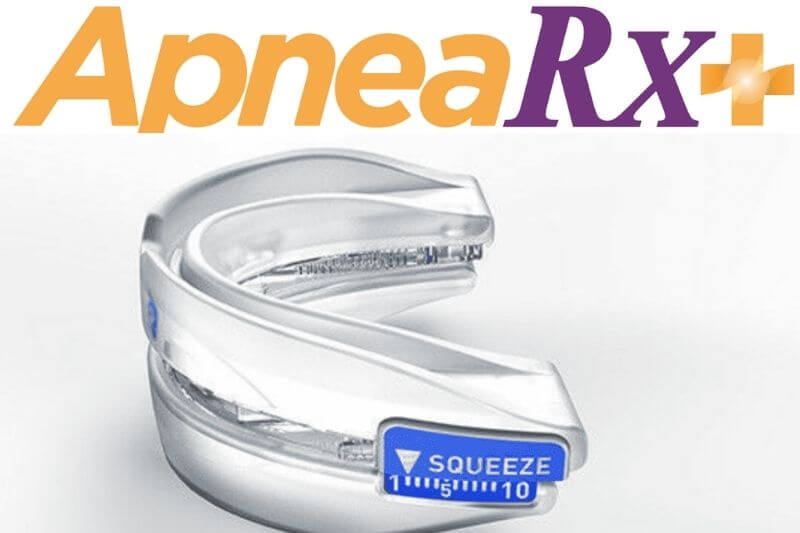
Thanks doc. I would have carelessly thrown away alot of money on this becaue i was desperate to find a cpap alternative. You in-depth analysis has proven to be very insightful and unbiased. Think ill just stick to my regular Cpap. If it aint broke…
Hi Vik,
Glad I could provide you with some useful and informative insights. All the best with your continuing CPAP treatment and sleep health.
Kind Regards.
Lana Eyeington, MSc.
Sleep Scientist, Clinical Exercise Physiologist
Dear Lana,
You have hit the nail on the head with this article.
Very well presented and controlled assessment of what could easily be construed as (at best) yet another waste of a lot of people’s money.
As the page ranking the company has obviously tried to do to enable potential customers to see all the different versions of the same “unbiassed reviews” is now starting to water down hopefully we will get to the truth.
Awesome work, please keep your eye out for more of this kind of trickery!!!
Hi, Well I did buy one as I thought it was worth a try. It does help keep my airway open by holding my bottom jaw forward when I sleep. I am sleeping more soundly now and I don’t wake up with a headache or a heavy feeling in my chest since using it. I do have some soreness in my teeth for a short time after removing it however, but I feel that it is worth putting up with, my teeth are not in great shape anyway. Also my bite takes a little while to get back into position after taking it out…but that seems to go back by itself pretty quickly. I am quite happy with it so far.
I have been using one for nearly a year, although I doubt that I would have even tried it, had I first read a critique such as this. Snoring was my big issue and my apnea level was tested as being only ‘mild.’ My wife assures me that I no longer snore when lying on my side (my usual sleeping position) but still snore a little if on my back. It did take a few weeks for me to get used to the device but there is no discomfort now. It is important to clean off any sharp bits after the ‘boil and shape’ – I used a hot soldering iron for smoothness. Also, the initial shaping should be done with lower jaw in the normal or slightly back position to allow for progressive indexing forward during the set-up phase. Perhaps I am one of the lucky ones as I am told that I have good a range of mandibular movement. I would complain about the price but this item has worked better for me than professional splints and at less cost! For snorers, it is definitely worth trying but I cannot speak for full-on sufferers of sleep apnea.
possible to use over dentures or made to fit dentures or without dentures Please let me know
Just a quick note to say thank you for such a comprehensive review of the ApneaRx device. I have mild sleep apnea and have been thinking of buying the device. But not after having read your article.
Thanks for your comment David. The purpose of the article was to simply help people like yourself make educated and informed buying decisions, so I’m glad that it was able to serve you to this end. Best wishes, Bill
I find the Apnea RX helps greatly with my apnea and snoring. My only complaint in that because I grind my teeth, I go through about a device every three months. I could never get comfortable with my cpap and disliked the sensation of positive air pressure when I opened my mouth.
Your investigation would put most people off buying this device but the majority of reviews I have read say it works. For people with mild symptoms this offers a relatively low cost experiment to see if this type of device works. As sleep experts, have you any actual experience of the efficacy of the ApneaRX?
Hi Martin,
Thank you for your comment. Lana Eyeington has conducted countless sleep studies on individuals with sleep apnea. She has no financial conflicts of interest and wrote this article to provide consumers with an informed view which includes all the facts.
The article is not intended to deter people from buying ApneaRX. If they’ve done their due diligence and want to experiment with the product, then by all means it’s their prerogative to buy it. Some people have had good experiences with it and others not so.
I am leery of some consumer reviews because, in my experience, I have seen how easy it is for dodgy marketers to write false testimonials from fictitious profiles. I’m not saying this is the case in this instance, but do take them with a grain of salt.
Kind regards,
Bill
I purchased an ApneaRX a long time ago (at least a year) and I found it uncomfortable and stopped using it after one night’s use. After a couple of camping trips where others refused to share a tent with me because of my snoring I decided to give it a go again. When I got home and before I started using it I recorded my snoring on my phone for a night to see how bad it really was as I never hear my snoring. It was surprisingly bad with long periods of complete silence that were broken by heavy gasps and snorts. I now completely understand others’ reactions.
Then I recorded my sleep while using the device over two consecutive nights. The difference was stark. I woke up without a headache which is unusual and I woke feeling unusually refreshed after sleeping. There were a couple of periods during each night where there was light snoring but only for a minute or so each time. There were no times where I stopped breathing though.
I felt discomfort in my jaws and my teeth hurt during the first week of using the device. After using it now for several weeks the jaw discomfort has gone but I still get a little soreness in my lower teeth but it goes after about half an hour or so.
This device works for me and I use it all the time now and I feel great every time I wake up and I do not have drowsy periods during the waking hours anymore. However, I believe I have been lucky to find a device that fits my particular sleep problem and I am sure there will be people with different sleep disorders that it would be totally useless for.
I don’t have health insurance and I wish I could afford a custom fit by a dentist.
Regards
Walter
Out of desperation I brought this for my hubby. His snoring was epic! So for our anniversary I treated myself to it. His first night wearing it was almost miraculous. There was no snoring, no gasping, nothing except for soft breathing sounds. He’s a Dairy Farmer so sleep is always at a premium. When he woke up that first morning after using it, he said his teeth were a little tender – but no headache and he felt like he’d actually slept. I’d honestly pay triple for the results we’ve had. He won’t sleep anywhere without now. We can’t recommend people trying this enough – it might not work for everyone but after seeing how amazing it is for us, I’m sure many others would love it too.
Hi Jo, Great news. For some people it may work just fine. If not, then always best to visit a professional for a custom fit. Kind regards
Thank you so much for this article. Even in 2019 based in NZ I can read a well researched view of this device. My husband has just been diagnosed and was thinking of buying one. I think we should wait for his CPAP machine to arrive first. Thanks again
Claire
Hi Claire,
Glad you found the article helpful. Always best to follow the doc’s advice.
Thanks Doc! I appreciate the work you’ve put into this article more than you’ll know.